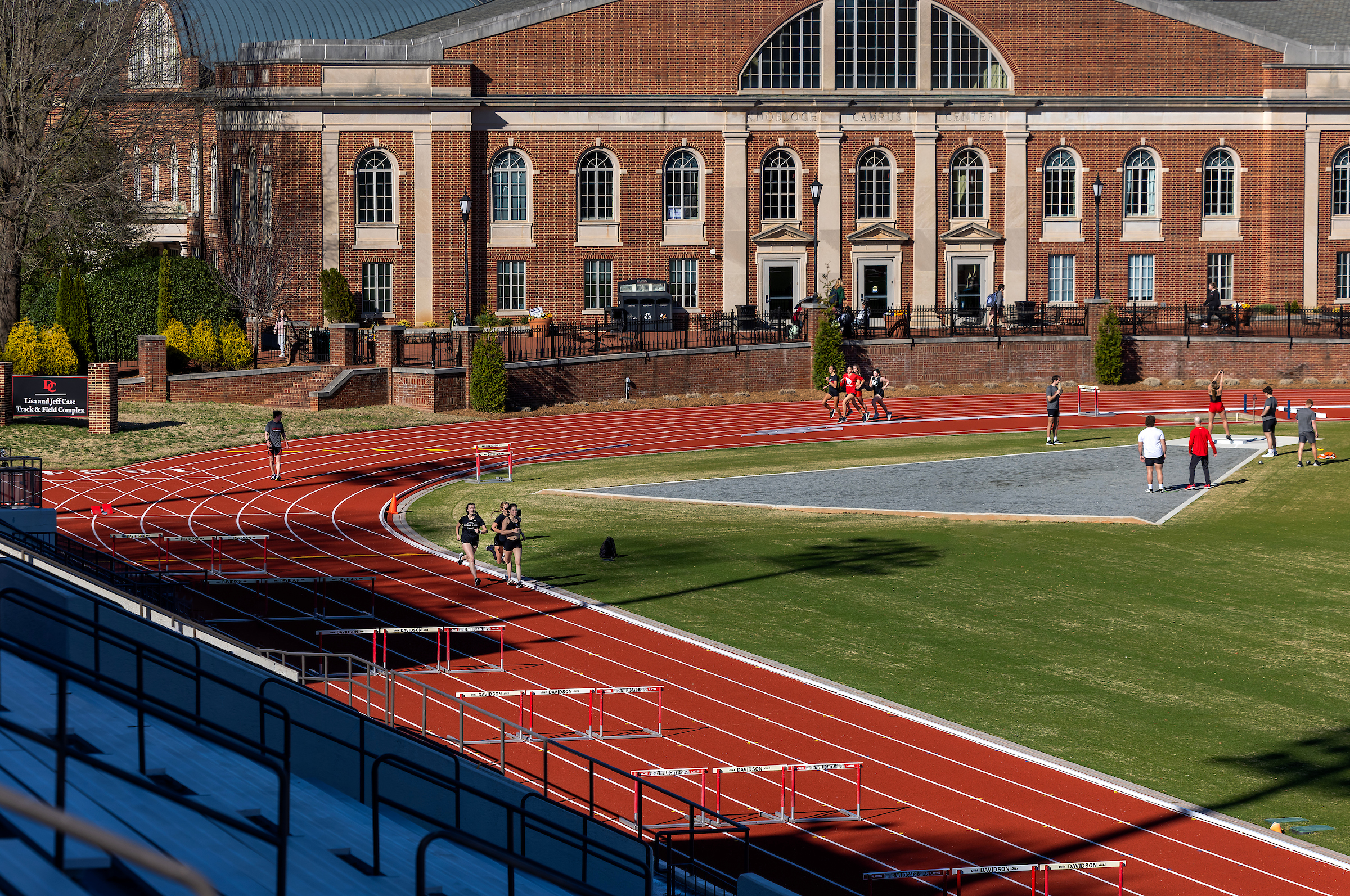In the Community, Out in the World: Spencer-Weinstein Award Winners Exemplify Leadership and Service
April 14, 2025
- Author
- Caroline Roy '20

Davidson College recently recognized one student and one faculty member with the Spencer-Weinstein Prize for Community and Justice, honoring their respective legacies of commitment to the Davidson College community. The annual award was created by close friends of the college, Carole and Marcus Weinstein.
The 2024-2025 recipients are Bonner and Kuykendall Scholar Victoria Ochieng ’27 for her entrepreneurship and for launching pivotal community initiatives in Davidson and Kenya, and Assistant Professor of Afro-Latin American Studies Vanessa Castañeda for her collaborative work addressing food justice and labor rights for immigrant workers in our region.
Victoria Ochieng ’27
Born and raised in Western Kenya, Victoria Ochieng found Davidson through the Kenya Scholar Access Program (KenSAP) and felt immediately drawn to the college’s emphasis on service and community. Before setting foot on campus, she knew she wanted to be involved at the Jay Hurt Hub for Innovation and Entrepreneurship.
“I felt like the Hurt Hub could give me everything I was looking for,” she said. “Serving as a Community Events Ambassador and now as an Events and Programs Specialist has allowed me to see entrepreneurship not only as something I can pursue, but as something I should pursue. It has also deepened my understanding of the kind of social entrepreneurship I want to champion in the world.”
The first step to launching a business idea, Ochieng learned, is identifying a problem. In her home country of Kenya, where farming is the dominant trade, she observed a large amount of produce going to waste each harvest. Sometimes, high yields of crops would go bad before selling, and other times, soil degradation made it difficult to grow anything at all.
She came up with a startup idea that would directly help coconut farmers in Kenya’s coastal community — using coconut husk waste to make both custom-crafted woven door mats and coco peat, a soil enhancer that helps crops flourish. The idea earned financial support through the Avinger Impact Fund.
“The wonderful thing about leadership is you don’t have to invent great ideas,” she said. “Just by communicating and sharing your vision, you learn that so many others are also invested. From there, you can build ideas together.”
Gender inequality is another issue close to heart and home for Ochieng. In her village, women can’t own land on their own, and many girls become wives and mothers at a young age. It wasn’t until she and her family moved to Nairobi that Ochieng was first exposed to women working as engineers, doctors and lawyers.
“I wanted to bring this perspective back home to show younger girls that there are other paths they can take,” she said.
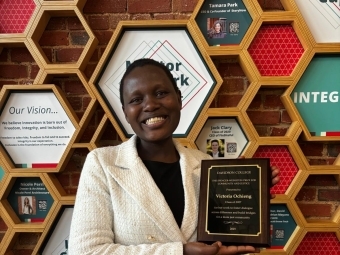
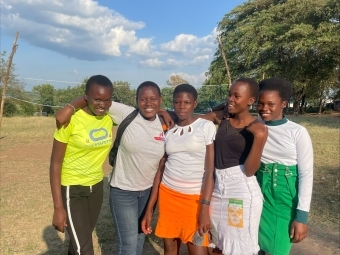
Last summer, she created and launched the Winjo Teens for Teens Project, now a group of 30 teen ambassadors tasked with advocating for reproductive health, providing free resources and serving as mentors in the community.
Ochieng is passionate about gender-based issues on Davidson’s campus, too. Last fall, she and a group of fellow Bonner Scholars took part in 16 Days of Activism Against Gender-Based Violence, an international initiative to spread awareness and open dialogue across campus channels — including a radio show in collaboration with WALT Student Radio.
“Service isn’t tied to a specific place,” Ochieng said. “As a Bonner Scholar, I’ve also been able to get involved locally with the Davidson Housing Coalition. I want to use my voice and my ability to bring people together to serve the community.”
Her list of meaningful campus involvements continues to grow. In addition to joining Davidson’s Entrepreneurship Club, she recently took a leadership role as chair of the Dean Rusk Global Corps, where she helps organize events like tea-time discussions on everything from global issues to international education programming.
“Davidson is great about seeing something good and encouraging more of it. I believe we all have a responsibility to pay it forward, to act when we see a problem or a pain point. It’s affirming in so many ways that Davidson recognizes this kind of work.”
Vanessa Castañeda
Vanessa Castañeda joined Davidson’s faculty in 2023. In her first two years, she has forged valuable partnerships outside the college and helped students learn about issues like labor rights and food justice through community-based work.
Castañeda’s research has always focused on the relationships between food, identity and culture in Latin America. As part of her “Intro to Latin American Studies” course, she invited El Futuro Es Nuestro (EFEN), a farmworker-led advocacy group, to speak to the class about issues of labor and migration, exploitation, and the experience of working in agriculture in North Carolina.
“Community is really important to me and crucial to my pedagogy and research,” Castañeda said. “Learning isn’t confined to the classroom. Connecting with our course material by talking to real people and learning from them as authorities of knowledge is something that sticks with students forever.”
In her course on food, gender and race, she asked EFEN, who agreed to collaborate with her class, which issues they most wanted to address. Together, they spent the semester researching farm workers living on mandatory meal plans. Monday through Friday, students conducted anonymous food surveys asking farm workers to report what they were eating in a day.
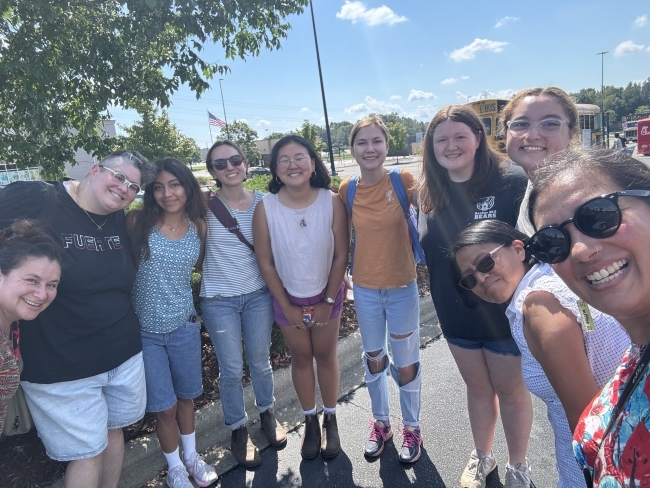
The students also collaborated with each other by using their strengths to contribute to the final product — some gathered data, some created policy briefs and others worked on a digital book they’ll present at the Verna Miller Case Research and Creative Works Symposium this spring. At the end of the course, they hosted The Farmworker’s Plate, a community event and discussion after which students, farmer workers and community members shared a meal.
“Food helps create community, and our community is ever-expanding,” Castañeda said. “I couldn’t have done any of this without the support of the Center for Civic Engagement (CCE).”
As a Community-Engaged Faculty Fellow with the CCE, she co-organized a screening and discussion of the film The Guestworker during National Farmworkers Awareness Week, brought three Afro-Latin American scholars to speak on campus and hosted renowned chef Cristina Martínez, who shared her journey as a Mexican immigrant and high-profile culinary artist.
In the coming years, Castañeda hopes to continue building these partnerships that bring a little bit of Davidson into the world and a little bit of the world to campus. Through the CCE, she has created an internship for students that exposes them to labor advocacy, activism and grant writing.
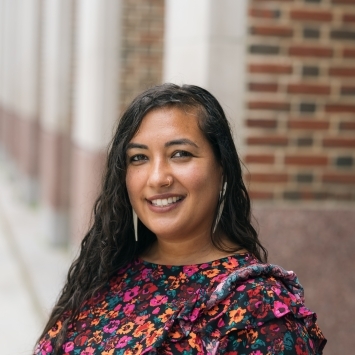
“Davidson students are prepared and, most importantly, curious about these issues. That’s what makes them such amazing collaborators. It feels great to see that Davidson understands and recognizes the importance of engaging in community — this transformative work is central to the kind of academic I want to be.”


